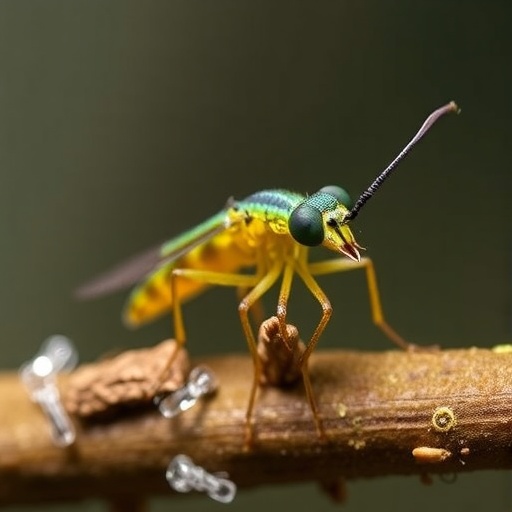
In a groundbreaking exploration of the intricate relationships between parasites and their hosts, a recent study published in Scientific Nature has uncovered astonishing manipulative behaviors exhibited by Pomphorhynchus laevis. These notorious parasites, often referred to as acanthocephalans, can intriguingly influence the behavior of their aquatic hosts. What makes this particular research notable is its revelation that such manipulations occur independently of the presence of gammarid conspecifics or predator cues, indicative of a more nuanced interaction within the aquatic ecosystem.
At the core of this study is the investigation into how Pomphorhynchus laevis modulates the behavior of its host, the freshwater shrimp. Historically, research on host-parasite dynamics has predominantly focused on how environmental factors, such as the presence of predators, might alter host behavior. However, the authors of this study have delved deeper, revealing that the parasite’s manipulative effects persist even when these external factors are absent. This raises critical questions regarding the mechanism of influence the parasite holds over its host, illuminating the evolutionary adaptations that underpin these interactions.
The methodology employed in this extensive research comprised a series of behavioral assays observing hosts under controlled conditions. The researchers meticulously documented the shrimp’s responses in varied environments to gauge the extent of manipulation by Pomphorhynchus laevis. The findings suggest that infected shrimp exhibit pronounced changes in swimming patterns, making them more susceptible to predation while inadvertently aiding in the parasite’s life cycle. Such alterations not only benefit the parasite’s propagation but also provide a rich field for understanding ecological dynamics within freshwater habitats.
Key to the findings is the concept of “manipulative parasitism,” where parasites enhance their own fitness by inducing risky behavior in their hosts. The shrimp, which normally avoid predators, exhibited a curious attraction to areas with high predator visibility when infected with the parasite. This results in a paradoxical situation where the host’s survival likelihood decreases, ultimately favoring the reproductive success of the parasite. These observations compel scientists to reassess the impact that these less visible players in aquatic ecosystems have on ecological balance.
A remarkable aspect of this study is the clarification of the relationship between the parasite’s manipulative behavior and the physiological changes induced in the host. Previous research had mainly associated such manipulative phenomena with psychological stress or fear response in hosts. Yet, this investigation leans towards a more biological interaction, where the parasite inflicts changes at a metabolic or neurological level. How exactly this manipulation operates at a biological level is still a subject of ongoing investigation but raises profound implications for our understanding of parasitism and its evolutionary advantages.
Moreover, the implications of these findings extend beyond mere academic curiosity. They touch upon biosafety, aquaculture, and conservation efforts. As freshwater ecosystems are vital for biodiversity, understanding these manipulative strategies is crucial for developing management strategies against parasitic infections that could destabilize aquatic populations. Consequently, this research holds potential value for policymakers aiming to preserve aquatic biodiversity amidst increasing environmental pressures.
In addition, the implications of the findings resonate with the emerging field of ecological entomology, where understanding interspecies interactions becomes essential for forecasting ecological outcomes. This is particularly pressing with the ongoing threats from climate change which may alter host-parasite dynamics and affect the health of freshwater ecosystems globally. Recognizing the potential for host manipulation could aid in predicting shifts in population distributions and ecosystem functions as environmental conditions change.
As researchers continue to deepen their investigative lenses, the role of host manipulation by parasites such as Pomphorhynchus laevis illuminates a broader narrative about life in aquatic habitats. Evolving interactions suggest an intricate web of life where parasites are not merely detrimental entities but active participants shaping the behavioral ecology of their hosts. This study provides a comprehensive look into the delicate balance of life underwater, marking a significant contribution to our understanding of ecological and evolutionary processes.
Ultimately, this research paves the way for further studies aimed at dissecting the pathways through which Pomphorhynchus laevis induces its manipulation. By exploring genetic, biochemical, and ecological factors contributing to these behaviors, researchers will uncover deeper insights into the fabric of host-parasite interactions. Each finding propels the field forward, shedding light on how parasites thrive in a myriad of environments and contexts.
Therefore, what remains clear is that while parasites like Pomphorhynchus laevis may pose risks to hosts, they also provide a fascinating glimpse into the complexities of survival strategies in nature. Their ability to manipulate hosts speaks volumes about the evolutionary arms race between parasites and their hosts, demanding rigorous investigation and awareness, particularly as environmental changes continue to unfold across the globe.
In conclusion, the extraordinary host manipulation exhibited by Pomphorhynchus laevis underlines not only the phylogenetic diversity of life forms on our planet but also the intricate connections that bind them within ecosystems. Whether through fostering predation risk or metabolic changes, these parasitic influences remind us that survival in nature is a multifaceted endeavor shaped by myriad interactions, often hidden from direct perception.
Subject of Research: Host manipulation by Pomphorhynchus laevis.
Article Title: Pomphorhynchus laevis host manipulation regardless of presence of gammarid conspecifics or predator cues.
Article References:
Fanton, H., Franquet, E. & Kaldonski, N. Pomphorhynchus laevis host manipulation regardless of presence of gammarid conspecifics or predator cues.
Sci Nat 112, 26 (2025). https://doi.org/10.1007/s00114-025-01975-3
Image Credits: AI Generated
DOI: https://doi.org/10.1007/s00114-025-01975-3
Keywords: Host-Parasite Interactions, Pomphorhynchus laevis, Manipulative Parasitism, Freshwater Ecosystems, Ecology.
Tags: acanthocephalan parasite behavioraquatic ecosystem interactionsbehavioral assays in parasitologyenvironmental factors in behavior alterationevolutionary adaptations in parasitesfreshwater shrimp parasite interactionsgammarid conspecifics and predator cueshost-parasite dynamicsindependent host manipulation by parasitesinfluence of parasites on host behaviormanipulative effects of parasitesPomphorhynchus laevis host manipulation





